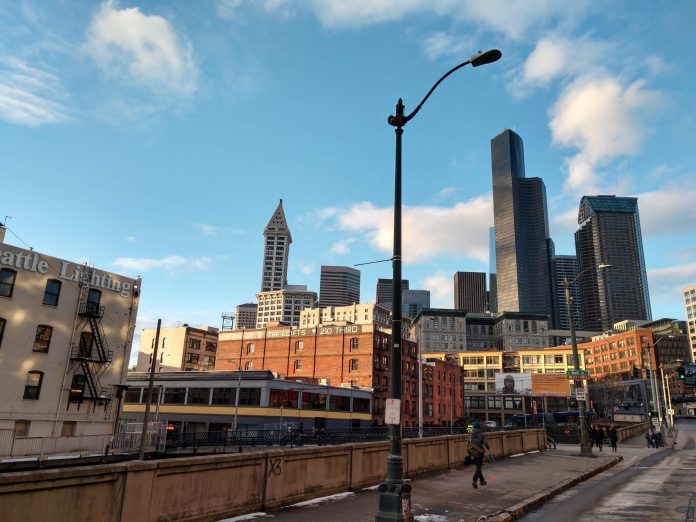Crosscut‘s opinion section is dead, the publication’s new executive editor M. David Lee III announced last week. The move will deprive Seattle of another major venue for thoughtful opinion pieces. The reasoning? Apparently, the board of Cascade Media (which runs Crosscut and KCTS public television) thought the opinion section had drifted too far left and struggled to get “enough” conservative voices.
Despite the board criticism, Crosscut opinion section had been a venue for some major conservative leaders in the state.
“In the recent past, those pieces have included opinions by former Washington state Republican Party chair Chris Vance, Republican congressman Dan Newhouse, right-wing radio host John Carlson, and Bryant,” Publicola‘s Erica Barnett noted in a Tuesday column. “Nonetheless, board members have reportedly raised concerns over the years that the opinion page slants left. The governing board that oversees the site includes a former Seattle Times editorial board member, former Republican attorney general and gubernatorial candidate Rob McKenna, and Amazon global real estate VP John Schoettler.”
Lee, who was hired away from the CBS affiliate in Green Bay, Wisconsin, agreed with the board’s take and sent a memo to Crosscut staff announcing he was ending the opinion section almost immediately upon assuming his new posting. The changes the board and new executive editor are implementing happen right as Crosscut lost one of its best reporters in David Kroman. Kroman accepted a job as a transportation reporter at The Seattle Times, but he said his move was not in reaction to the change in leadership. His broader City Hall coverage will be missed.
The announcement has laid bare an identity crisis both at Crosscut and the media landscape regionwide. Crosscut doesn’t want to be the region’s progressive publication. But who does?
A generation ago, the Seattle Post-Intelligencer (PI) played the more progressive foil to the region’s most-read newspaper: the Seattle Times — not to mention like-minded business papers like Daily Journal of Commerce and the Puget Sound Business Journal. However, the P-I stopped going to print in 2009. The Stranger took up the mantle as “Seattle’s only newspaper” — a dig at the fact Seattle Times publisher Frank Blethen lives on Mercer Island and embodies an Eastside rather than Seattle perspective.
The Stranger is also struggling to make ends meet and went from a weekly publication to a fortnightly even before the pandemic ripped a hole in its business. Federal relief funds helped plug some budget holes, but the staff is a shell of its former self as revenue has decreased. Many of its high-profile reporters have left for the Seattle Times (Heidi Groover and Sydney Brownstone), freelancing (Nathalie Graham), careers as political staffers (Ansel Herz), or Substack/law school (Eli Sanders).
As progressive print media shrinks, TV landscape is consolidating in conservative hands. The ultra-conservative Sinclair family purchased KOMO TV in 2018, and nearly immediately forced conservative framing, especially on issues like the homelessness crisis. Q13 is the local Fox affiliate — Fox is the media empire built by conservative billionaire Rupert Murdoch. That leaves KING TV and KIRO TV for those who don’t want to get news through a conservative prism, but that doesn’t mean either is progressive in framing. KING is Owned by publicly traded Tegna company (formerly Gannett) and KIRO TV is owned by Cox Media Group, while the KIRO radio arm is owned by a conglomerate wholly owned by The Church of Jesus Christ of Latter-day Saints and dedicated to family values oriented broadcasting. And with KCTS public TV under the same management as Crosscut, Seattle doesn’t really have a progressive local TV outlet, although there are many flavors of conservative and centrist.
Clearly, conservative media takeover by extreme fact-free alt-right outlets — from Fox News to Breitbart and Zero Hedge — is having an impact on our national debate and making consensus very hard on commonsense interventions for the economy, public health, and climate change mitigation. The same thing could be happening on a smaller scale with the erosion of local progressive media and the domination of centrist and right-wing framing.
Erica Barnett and Josh Feit left The Stranger to found the online publication Publicola, which serves at another progressive anchor in a sea of centrist media. But Publicola, The Stranger, the South Seattle Emerald, Capitol Hill Seattle Blog, Real Change, and yours truly at The Urbanist can only do so much against the rising tide of conservative and centrist media. Working with less funding and legacy media members sometimes looking down their noses at us, we try.
However, the results of the 2021 election shows centrist messaging is winning the day, at least in an election in which frustration with the status quo was sky-high and desire to hear about complicated, nuanced policy interventions was low. This isn’t only a problem stemming from media environment. Progressives must also adapt and run tighter campaigns. But a more hospitable media environment for progressive ideas and a more critical environment for vague centrist talking points certainly wouldn’t hurt.

For a city that often wears its progressive reputation like a badge of honor, the media landscape doesn’t match.
Both Crosscut and Seattle Weekly (an alternative paper which closed shop last year) were founded by David Brewster, who has since moved on to launch the blog Post Alley and a private subscription-based library called the Athenaeum. Despite the Cascade Media anxieties that progressives had infiltrated the Crosscut ranks, a perusing of Post Alley should put to bed any worries that Crosscut or Seattle Weekly were long run as a progressive puppets. Post Alley seems to have collected a wide assortment of partially retired journalists and politicos looking to share nearly identical centrist views and gripe about the excesses of Leftist extremists. Longtime P-I politics reporter Joel Connelly is right at home in such a environment, which also seems to cast doubts on how progressive the P-I really was.
Still Crosscut‘s penchant for publishing progressive opinion pieces did make it unique in a region where getting such pieces in the Seattle Times is like passing through a crucible. The Seattle Times opinion page will run dozens of stories fastidiously adhering to conservative messaging on the issues of the day, whether homelessness, policing, criminal justice, or how mean Nicole Thomas-Kennedy’s tweets were. Advocates for a progressive view, however, will struggle to find comparable mouthpieces.
As a result, when progressive proposals arise, they are lambasted in the Seattle Times — sometimes even before they’re officially rolled out, while the progressive response is drowned out. This is what happened with the single family zoning changes that the Housing Affordability Livability Agenda (HALA) committee were mulling in 2015. Seattle Times columnist Denny Westneat got his hands on a draft report and sunk the idea with an inflammatory article before the final proposal had even seen the light of day. The ensuing uproar caused Mayor Ed Murray to abandon broad single family zoning reform. This has put Seattle behind peer cities like Portland, Minneapolis, Olympia, and perhaps soon Tacoma, all of which have loosened zoning restrictions in single family zones.
And, the anti-upzone framing sometimes has bled into news coverage, too, such as when they regurgitated NIMBY talking points rather than take a sober look at displacement risk. Plus, the Seattle Times broke a former taboo by selling a front page above-the-fold political ad, and a negative attack at that, targeting Thomas-Kennedy.
The Seattle Times editorial board doesn’t always get what it wants. The region passed Sound Transit 2 and Sound Transit 3 light rail measures despite their strident endorsements against it. The Seattle City Council passed the JumpStart payroll tax despite a steady drumbeat of Seattle Times editorials and opinion pieces railing against it. But the headwinds in mainstream media do make it hard to build momentum behind progressive policy and carry that into the next election.
While it seems unlikely one publication with arise with half a million daily readers will arise to be a progressive counterbalance to the Seattle Times, a strong ecosystem of small- to mid-sized publications willing to question centrist framing and give progressive narratives a fair shake could potentially do the trick.
On a personal note, I’m grateful to our subscribers who make The Urbanist’s efforts to tell this story possible.
Correction: This article was updated to note KIRO-TV is not owned by the same company as KIRO radio, which had been incorrectly stated before. Also added context from Kroman who said he did not leave due to the change in leadership at Cascadia Media and will cover more than just the Seattle Monorail, which had been a joke.
Doug Trumm is publisher of The Urbanist. An Urbanist writer since 2015, he dreams of pedestrian streets, bus lanes, and a mass-timber building spree to end our housing crisis. He graduated from the Evans School of Public Policy and Governance at the University of Washington in 2019. He lives in Seattle's Fremont neighborhood and loves to explore the city by foot and by bike.


